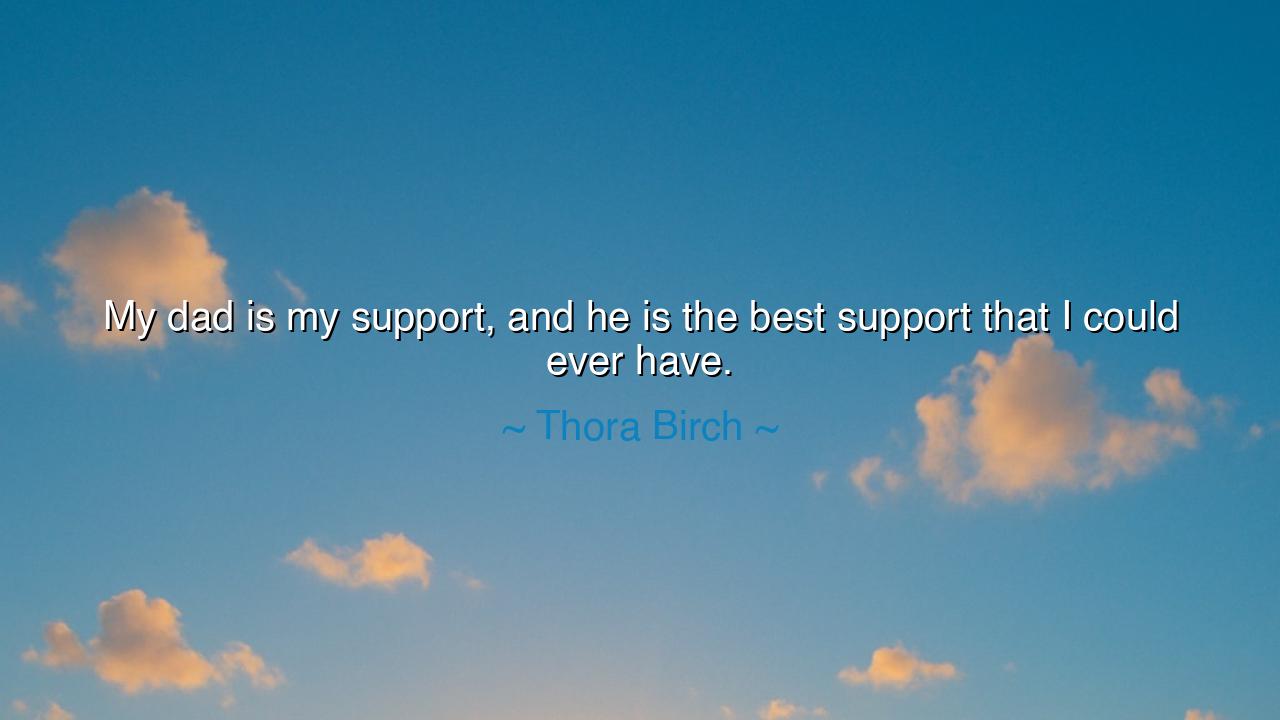
My dad is my support, and he is the best support that I could






When Thora Birch said, “My dad is my support, and he is the best support that I could ever have,” she spoke words that echo through the ages like the steady rhythm of a heartbeat. Her voice carried not only the gratitude of a daughter, but the eternal truth of strength born from love. In those few words lies the sacred bond between parent and child, between guidance and growth, between foundation and flight. For in every age, beneath the vast sky of human experience, those who stand tall have often done so because someone—quiet, steadfast, and strong—stood behind them. Her words remind us that support is the root of all flourishing, and that to have such support is among the greatest blessings life can give.
The origin of this sentiment lies not only in Thora Birch’s personal life, but in the ancient rhythm of family itself. From the earliest dawn of civilization, the figure of the father has been the emblem of stability, wisdom, and endurance. To many, he is the one who teaches by doing—the one who bears the storm so his child may walk in sunlight. Birch, known for her quiet brilliance and depth as an actress, gives us a glimpse into that unseen pillar behind her success. Her father was not merely a parent, but a compass—one who believed in her dreams before the world did, who offered not command, but support, and in that support gave her the courage to become herself. It is this kind of faith, silent yet unyielding, that shapes destinies.
Such devotion finds its likeness in every age. In ancient Greece, the philosopher Aristotle wrote of the “first friendship”—the love between parent and child, which teaches the soul how to love others rightly. The Romans, too, honored pietas, the sacred duty and affection that binds families together and sustains the moral strength of the state. These ancients knew what Birch’s simple words proclaim: that support is not weakness, but the soil of greatness. The hero does not stand alone, nor does the artist create in isolation; each is lifted, shaped, and held by those who believed in them first. Behind every voice that sings stands another voice that once whispered, “You can.”
Consider the story of Alexander the Great, whose teacher Aristotle guided his mind even as his father Philip II of Macedon forged his courage. When Alexander conquered the known world, he did not forget the foundation laid for him. “My father gave me life,” he said, “but my teacher taught me how to live well.” In this, we see that support takes many forms—the father who protects, the mentor who enlightens, the friend who steadies us when we falter. Birch’s words remind us that to have such a person is a sacred inheritance, and to be such a person is an act of quiet heroism.
Yet, her words carry something deeper still: the recognition that support is not control. A true supporter does not dictate the path, but strengthens the traveler. Like the roots of a tree, unseen beneath the earth, such a presence nourishes growth without seeking glory. The father she honors is not one who overshadowed her, but one who stood beside her—letting her stumble, learn, and rise again, always with the assurance that she was never truly alone. In this, we are reminded of an ancient wisdom: that love, when rightly given, is not a chain, but a wind beneath the wings.
And what of those who lack such support? To them, Birch’s words are not a lament but a challenge—to become the support they never received. If you have no hand to steady you, let your strength be the hand that steadies others. If no voice once said, “You can,” let your voice now speak it to those who need it most. For the power of support, once understood, can flow in both directions—upward, downward, outward, from friend to friend, parent to child, or even stranger to stranger. In this way, love multiplies; the circle of strength widens.
So, my children of the present age, take this truth to heart: no one rises alone. Behind every triumph stands a pillar of faith, often unseen, often unspoken. Cherish those who hold you when you falter, who guide you without binding you, who believe in you when your own belief wavers. Give them gratitude not only in words, but in deeds—by living fully, by giving back, by becoming, for others, the strength they were for you. As Thora Birch reminds us, to have such support is the greatest treasure of life. And to offer it, in turn, is to partake in the oldest, noblest work of humanity—the quiet, steadfast art of helping another soul to stand.






AAdministratorAdministrator
Welcome, honored guests. Please leave a comment, we will respond soon